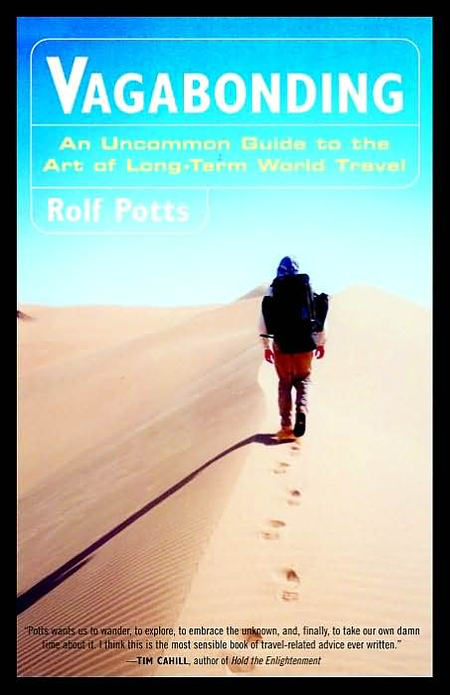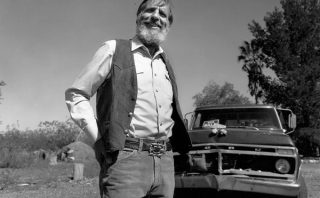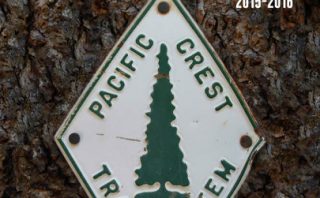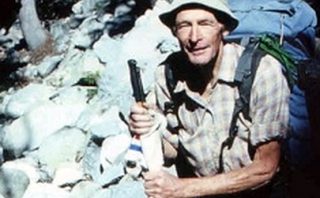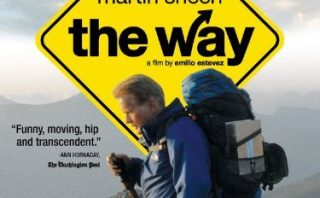Back when I first moved overseas to Malaysia and was also first getting serious about hiking the Pacific Crest Trail, I was reading a lot of travel and trail blogs. One book, Vagabonding, kept showing up on “books you have to read” lists on both types of blogs.
So I went to the bookstore, which meant taking a taxi to the lightrail train, and the lightrail to the Suria KLCC (Kuala Lumpur City Center) shopping mall underneath the Petronas Twin Towers. I was in luck. The Kinokuniya Bookstore had a copy in English. Shortly after, my daughter and I took turns reading it out loud to each other on a vagabond style trip to Cambodia.
That was several years ago. But I find myself coming back to the book. Sometimes I go back for travel tips. But mostly I go back to refresh my vagabonding outlook.
Vagabond refers to a wanderer without a fixed home. In Vagabonding: An Uncommon Guide to the Art of Long-Term World Travel, Rolf Potts has put a creative twist on the word.
Vagabonding — n. (1) The act of leaving behind the orderly world to travel independently for an extended period of time. (2) A privately meaningful manner of travel that emphasizes creativity, adventure, awareness, simplicity, discovery, independence, realism, self-reliance, and the growth of the spirit. (3) A deliberate way of living that makes freedom to travel possible.
Outlook on Life
Early in his book, Rolf writes, “But beyond travel, vagabonding is an outlook on life.” This outlook is maybe best understood by looking at the vagabond after they’ve returned home. In his final chapter, Living the Story, Rolf describes the vagabonds challenges when back at home, adjusting to home routines, and homesickness for the road. These are experiences not unique to returning vagabonds. Returning long trail hikers experience much the same. But, as Rolf notes,
If travel truly is in the journey and not the destination, if travel really is an attitude of awareness and openness to new things, then any moment can be considered travel.
By living the story, Rolf is talking about doing the things, keeping the attitudes, and maintaining the outlook that is vagabonding.
Keep things real, and keep on learning. Be creative, and get into adventures. Earn your freedom all over again and don’t set limits. Keep things simple, and let your spirit grow.
I have yet to meet a long trail hiker or long term traveler who has not been changed by their journey, myself included. We sometimes joke how we’ve been ruined for normal life. After living so long on the trail or on the road, this new outlook on life becomes a part of us and our daily lives and doesn’t go away.
Adding to the Outlook
If we can vagabond in our daily home life — travel in any moment — we can also vagabond on vacation. And maybe I take a little different view than Rolf here. In his chapter Keeping It Real, he says,
This is why vagabonding is not to be confused with a mere vacation, where the only goal is escape. With escape in mind, vacationers tend to approach their holiday with a grim resolve, determined to make their experience live up to their expectations; on the vagabonding road, you prepare for the long haul knowing that the predictable and the unpredictable, the pleasant and the unpleasant are not separate but part of the same ongoing reality.
Like Rolf, I know people who escape on their vacation. I know people who go to exotic places like Bali in Indonesia and Thailand and check into an upscale hotel, probably the local version of an upscale hotel chain found all over the world. They go to the hotel or nearby restaurants and eat mostly Western cuisine. They lounge poolside. They may go on an organized tour to a popular tourist destination with a guide on an air-conditioned bus, and immediately after retreat back to their hotel. And that’s okay. They can escape on their vacation if they want.
But you can also vagabond on your vacation. That’s what I do. I have an advantage of being an expatriate and living overseas right now. My home is in foreign, exotic places. At the same time, my travel is pretty much limited to when my spouse has time off from her job.
So we’re basically on vacation time frames with only a week or two off at a time when we travel. But that doesn’t stop us from vagabonding. We live simply, do our work, save our money, stay out of debt, go lightly (only a small backpack each), find adventure in daily living, take local transport, meet people where they live and work, get off the beaten track … paraphrasing Rolf a bit, we seek “interesting surroundings” and are “continually interested in whatever surrounds” us.
The vagabonding outlook can go with us on travels, on vacations, and at home.

